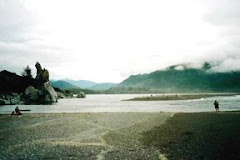The meeting came on the heels of public release of new studies and reports by panels of scientists asked to assess likely impacts of removing four of the dams and transferring a fifth PacifiCorp dam and reservoir – Keno – to the Bureau of Reclamation. Those reports and other completed assessments have focused attention on Keno Reservoir which currently has the worst water quality found anywhere in the Klamath River Basin.
Keno Reservoir receives polluted wastewater from over 200,000 acres of irrigated agriculture. The reservoir is so polluted that ammonia, which is directly toxic to all aquatic life, is sometimes produced
Why did the Orleans meeting focus not on the four PacifiCorp dams proposed for removal but rather on the one dam and reservoir which would stay in place? For one thing, removing the four dams but leaving Keno as is will mean that water quality in the Klamath River below will remain poor. In some months Klamath River water quality would be worse than it is now with the four other dams in place. Furthermore, a panel of independent fisheries scientists do not believe salmon restoration in the Upper Klamath River Basin will be successful unless the severe water quality problems in Keno Reservoir and Upper Klamath Lake are effectively addressed.
If Keno Dam and Reservoir were relicensed by the Federal Energy Regulatory Commission – that is, if PacifiCorp had decided to retain ownership - the company would have had to obtain 401water quality certification from the State of Oregon. That in turn would require that PacifiCorp develop and commit to a plan to clean-up pollution in the Reservoir. If Keno is transferred to the Bureau of Reclamation, however, no 401 certification is planned. Furthermore, the KBRA Water Deal would put dealing with water quality in Keno Reservoir in the hands of the Basin’s Irrigation Elite. But it will be difficult to get the Irrigation Elite to take the action needed to clean up Keno pollution. That’s because clean-up would likely require restoring some current farmland to marshes; the Irrigation Elite has adamantly opposed marsh restoration in the area.
Klamath River advocates and organizations who are not bought into the KBRA Water Deal insist that Keno clean-up must be assured before any deal on the Klamath River dams receives legislative backing. The Resighini Rancheria – a small federal tribe located wholly within the external boundaries of the Yurok Reservation – was among those who focused on clean-up of Keno pollution at the Orleans meeting. Rancheria representatives appear to understand that failure to secure a commitment to Keno clean-up as part of a larger dam removal deal will at best delay Klamath River restoration and could frustrate salmon recovery.
Tribal, fishing and environmental interests who are “parties” to the KBRA claim they are for Klamath River restoration; there is no reason to doubt them since restoration is where their interests lie. With the new studies and opinions focused on problems at Keno, these “parties” should now recognize that Keno clean-up must be hard wired as part of a larger dam agreement and legislation to implement such an agreement. However, their KBRA Deal with the Irrigation Elite could prevent these “parties” from taking a strong position on Keno clean-up.
On the other hand, Keno clean-up could be the issue which reunites those traditional Klamath River partners who have been divided by the KBRA Water Deal. Will KBRA environmental, tribal and fishing “parties” follow their own interests and support hard-wired Keno clean-up or will they defer to the Irrigation Elite and support legislation which facilities removal of four PacifiCorp dams but transfers Keno to the Bureau of Reclamation without assuring that the polluted reservoir will be cleaned-up?
Stay tuned.



No comments:
Post a Comment